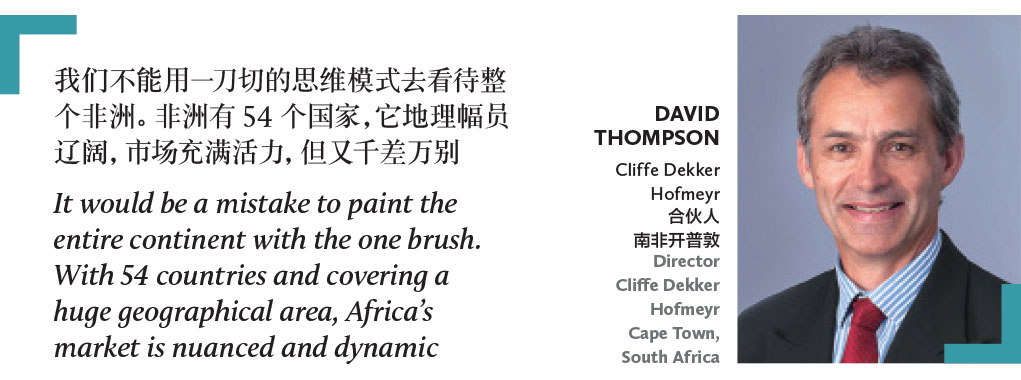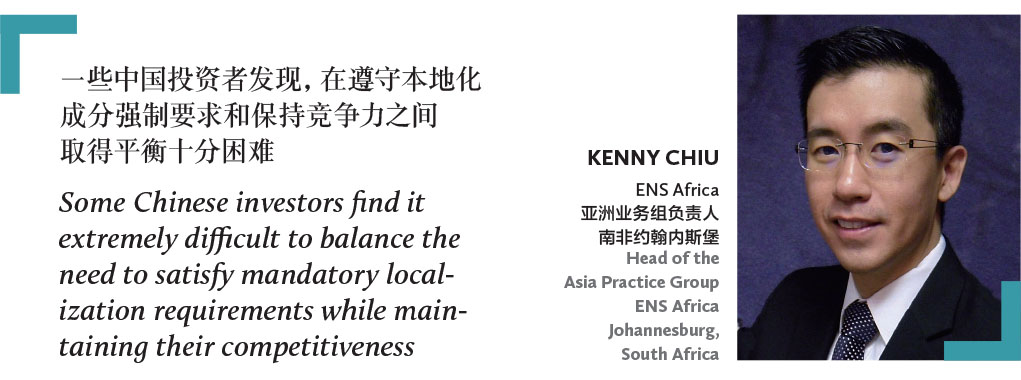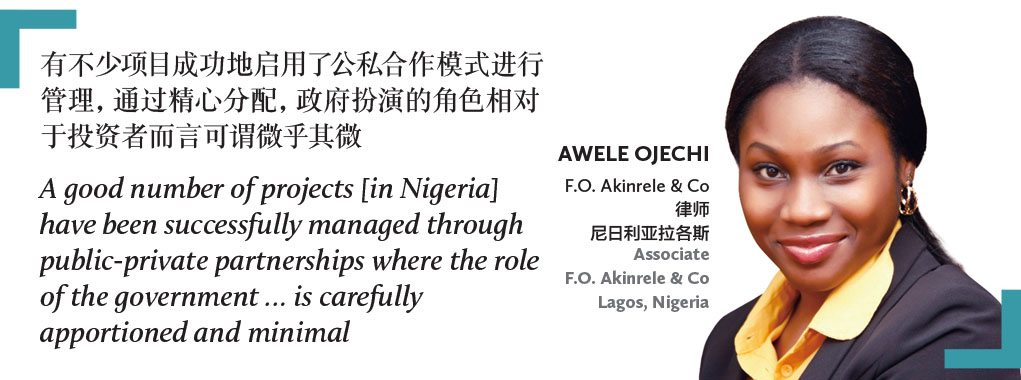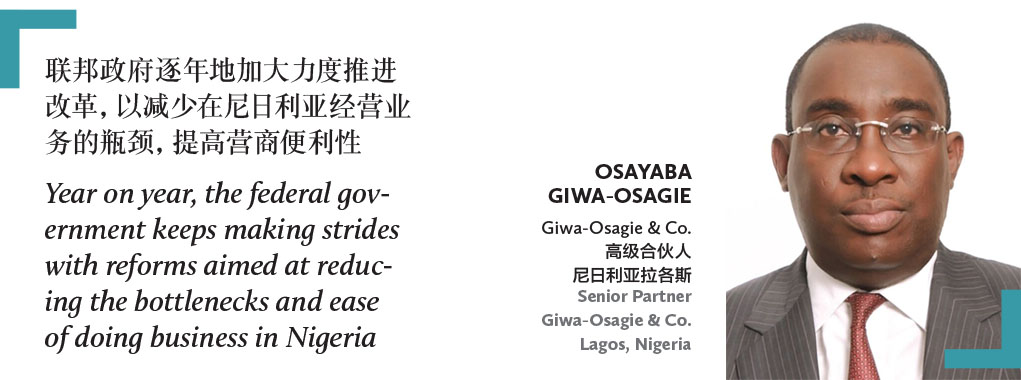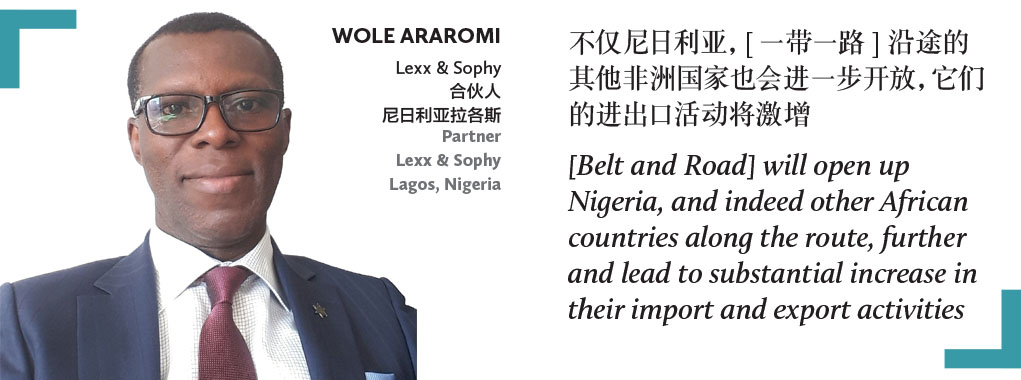China continues to expand its influence in Africa as foreign direct investment reaches an all-time high. However, striking a balance with citizen empowerment policies is proving to be a challenge. Vanessa Ip reports.
There is no other country more entrenched in today’s Africa than China. According to a 2017 report by McKinsey & Company, Dance of the lions and dragons: How are Africa and China engaging and how will the partnership evolve?, more than 10,000 Chinese-owned firms are currently operating in Africa. Levels of trade, investment, infrastructure, financing and aid from China are unsurpassed. At the 2015 Forum on China-Africa Co-operation (FOCAC) summit, President Xi Jinping pledged to invest US$60 billion in Africa by the end of 2018. Although it is currently unclear how much of this has resulted in capital actually committed, there is no question that China has become Africa’s most important economic partner, with further momentum being gained from the Belt and Road initiative.
McKinsey reports that Chinese-African trade has grown by approximately 20% per year, from US$13bn in 2001 to US$188bn in 2015. Foreign direct investment (FDI) has grown by 40% per year from US$1bn in 2004 to over US$35bn in 2015. Since 2015, China has become the single largest bilateral infrastructure financier in Africa.
Another 2017 report by Big Four accounting firm Ernst and Young, titled Connectivity Redefined, notes most of China’s financial flows into Africa are in the form of development assistance (loans and aid). FDI patterns have held steady in spite of growing global uncertainty, with China becoming increasingly important as an FDI provider, as Africa’s biggest traditional investors, the US and UK, face domestic policy changes and uncertainty.
“Looking at Africa in general, we see industries responding to the continent’s emerging and growing consumer class,” says David Thompson, director and regional practice head of corporate and commercial at Cliffe Dekker Hofmeyr in Cape Town, South Africa. “Manufacturing, technology, media and telecoms, and consumer products and retail sectors are coming into their own, where previously the main focus was extractive industries and infrastructure.
“However, it would be a mistake to paint the entire continent with the one brush. With 54 countries and covering a huge geographical area, Africa’s market is nuanced and dynamic, with key pockets of investment potential.”
Part One of this special report will focus on key developments in Central, Western and Southern Africa, covering Angola, Botswana, Cameroon, Cape Verde, Ghana, Mali, Nigeria, and South Africa.
THE SOUTH
Botswana. According to Tatenda Dumba, senior associate at Minchin & Kelly in Gaborone, Chinese entities are dominant in the construction and retail clothing sectors in Botswana. The Chinese have been behind the construction of several high-end buildings in the commercial and residential sectors, and have plans to dominate the local manufacturing industry. She says that while Botswana relies heavily on mining, the government is encouraging investors to establish alternative businesses. In particular, it is welcoming manufacturing companies and science and technology companies.
Dumba says the regulatory environment in Botswana is “generally easy for foreign investors”, and the Botswana Investment Trade Centre, a government agency, encourages FDI by offering attractive tax haven structures and financial grants. “The only regulatory challenges they face is that certain industries are restricted to citizen-owned enterprises, especially those in normal trading businesses such as retail clothing or supply of wholesale durable goods,” she says. “Therefore, to obtain trade licences to conduct such businesses is often a challenge. The government of Botswana is also moving increasingly towards citizen economic empowerment, therefore it is more welcoming of foreign investors that partner with locals.”
Dumba urges Chinese investors to become familiar with the Special Economic Zones Act, which came into force on 2 May 2016, and which has the objective of establishing, developing and managing special economic zones in order to create a conducive environment for local and foreign investment, and help the expansion of employment opportunities and attainment of economic growth targets in Botswana.
South Africa. The country is one of the largest hubs for Chinese FDI and is also the continent’s largest intra-regional investor. According to fDi Markets, South Africa is among the top five African destinations for Chinese direct investment, receiving more than US$5 billion between 2003-2017.
Chinese investment in South Africa remains focused on mining, resources and infrastructure. However, according to Thompson, the country also acts as an anchor economy, from which to launch ambitions into the rest of the continent. “In the past few years, we have seen and welcomed Chinese investment in South Africa’s manufacturing, banking, technology, media and telecoms [TMT], consumer products and retail, services, infrastructure, real estate, hospitality, and construction sectors,” he says. “This diversification runs alongside more traditional and still-substantial investment in South Africa’s extraction industries.”
Thompson’s firm, Cliffe Dekker Hofmeyr, recently acted for SOIHL, a subsidiary of Sinopec Group, in the single-largest acquisition (if implemented) by a Chinese firm of a controlling stake in a major South African company. Sinopec acquired a 75% stake in Chevron’s South Africa and Botswana assets for US$900 million. According to Thompson, in line with South African regulation, the remaining 25% of Chevron’s South Africa and Botswana assets are held by a consortium of Black Economic Empowerment (BEE) shareholders and an employee trust.
“In January 2018, South Africa’s Competition Commission recommended the conditional approval of the Sinopec and Chevron merger,” he says. “The conditions give insight into the unique public interest challenges associated with significant South African deals, and how these factors need to be weighed against commercial considerations.
“Sinopec agreed to establish roots in South Africa, using the country as a regional base for its midstream and downstream operations in Africa, and as a platform from which to pursue its future expansion into Africa. In addition, Sinopec promised to make investments over five years to upgrade the Cape Town refinery into a world-class plant; to maintain the current level of employment post-acquisition, and not make any retrenchments for a few years post-acquisition, and to favour small and black-owned businesses as fuel retailers when developing their fuel marketing business.”
Pieter Steyn, director of Werksmans in Johannesburg, says the newly formed BEE Commission is becoming a “force to be reckoned with”. “The regulatory environment is continuously changing and developing, and Chinese investors must remain up to date,” he says.
However, remaining up to date on localization requirements is something that Kenny Chiu, head of the Asia Practice Group at ENS Africa in Johannesburg, says Chinese investors operating in Africa are still grappling with. “Each country has different localization requirements, but they all share a common theme: introducing government policy and socio-economic processes that seek to contribute to the economic transformation of the host country by increasing the participation of local Africans that manage, own and control the country’s economy,” says Chiu.
“Some Chinese investors find it extremely difficult to balance the need to satisfy mandatory localization requirements while maintaining their competitiveness. Further, instead of engaging a proper adviser, some of these investors rely on outdated information found on the internet, or hearsay from other investors, resulting in a waste of time and resources.”
Another legal challenge, says Chiu, is that some investors do not take tax planning seriously in their decision making process. He says that the investor’s tax-planning strategy must not only be optimal and efficient for present purposes, but be sufficiently resilient to deal with rapidly changing international tax policies.
“Historically, Chinese companies generally made their offshore investments using a Hong Kong structure via either the British Virgin Islands (BVI) or Bermuda,” he says. “Although such a structure may be beneficial from a Chinese tax perspective, it is generally neither optimal nor efficient from a South African tax perspective.
“For example, as South Africa does not have double-tax treaties with BVI or Bermuda, the result is that there is likely to be substantial tax leakage on payments from South Africa to the intermediary company in BVI or Bermuda that would erode the ultimate benefits of the structure.”
Steyn adds that it is critical for Chinese investors to understand and structure their investments in the most tax-efficient way by having regard to exchange controls, local labour and immigration laws, available incentives such as special investment zones, environmental and competition laws, as well as required licences and permits. “These vary from country to country and the ‘prevention is better than cure’ principle is recommended,” he says.
Nigeria. Africa’s key hub economies like Nigeria remain the top recipients of FDI, and while investment levels are expected to grow, Ernst and Young reports that Nigeria is “weakened” by the current political climate, as well as the effect of the oil price environment on foreign exchange and businesses.
Kunle Ajagbe, a partner at Aidan Partners in Lagos, says Nigeria is just exiting its worst economic recession in decades. One of the implications of this has been its impact on contracts and foreign currency risks. “A notable regulatory development in the recent period from within Nigeria is the tightening of the expatriate quota permit regime,” he says.
“By a recent presidential order, preference is now to be given to Nigerian workers over expatriates. This has generally been the position in Nigeria and this latest order is therefore seen as tightening that position even more. What this means is that there may be visa delays or even refusals to some Chinese applicants. There is no reason to believe that it is targeted at the Chinese business community, but it is a development to be noted.”
Despite the political and economic environments, Muyiwa Balogun, a partner, and Khadija Yusuf, a senior associate, at Olaniwun Ajayi in Lagos, say that China continues to show increasing interest in strengthening economic ties with Africa.
“Particularly in furtherance of its economic interests in Nigeria, the Chinese government has employed various approaches to its engagement with the Nigerian economy including policy statements, bilateral agreements and public private partnerships,” says Balogun.
For example, Yusuf says that “in order to bridge the infrastructure funding gaps in the Nigerian oil and gas sector, the minister of state for petroleum, during a three-day road show in China, signed memorandums of understanding (MoUs) with several Chinese firms for more than US$80 billion of new investments, spanning five years… covering pipelines, refineries, gas and power, facility refurbishments and upstream financing”.
“This is in addition to obtaining commitments from Sinopec and China National Offshore Oil Corporation (CNOOC) to commit to further investments in Nigeria’s upstream oil sub-sector to the tune of US$20 billion, which would be concluded within a few months. China is known to utilise both state-owned oil companies Sinopec and CNOOC in buying shares in oilfields in Nigeria.”
Apart from oil and gas, Awele Ojechi, an associate at F.O. Akinrele & Co in Lagos, says popular industries for Chinese direct investment in Nigeria include infrastructure and construction, agriculture and telecoms. But in any industry, she says that the major challenges faced by investors include lack of government funding for developmental projects on account of economic difficulties. “This results in heavy financial reliance being placed upon the investor to fund each project, almost in its entirety,” she says. “However, a good number of projects have been [and are being] successfully managed through public-private partnerships where the role of the government, vis-a-vis the investor, is carefully apportioned and minimal.”
Other legal and regulatory challenges faced by investors, as observed by practitioners, include: an inconsistent foreign exchange policy; irregular customs policies and slow customs clearance; a slow legal system; bureaucracy and red tape, especially regarding business registrations, licences and permits.
However, “[it should be noted that] year on year, the federal government keeps making strides with reforms aimed at reducing the bottlenecks and ease of doing business in Nigeria”, says Osayaba Giwa-Osagie, a senior partner at Giwa-Osagie & Co. in Lagos. “The impact of these reforms was evident in the World Bank’s recently released Doing Business 2018 report titled Reforming to Create Jobs, as Nigeria moved 24 places up the index to 145th and ranked in the top 10 most improved countries.”
One of the key reforms owing to the spike in rankings was the creation of the Presidential Enabling Business and Environment Council (PEBEC). Its operational arm, the Enabling Business Environment Secretariat (EBES) agency, became functional in late 2016. According to Giwa-Osagie, the PEBEC’s two key executive bills, the Collateral Registry Bill and the Credit Services Bureau Bill, were passed into law with the objective of improving access to financing for SMEs and to promote access to accurate and fair credit information. He says that areas where Nigeria has improved the most are starting a business, getting construction permits, getting credit and ease of payment of taxes.
“The Federal Competition and Consumer Protection Bill has been recently passed by the National Assembly and awaits the president’s assent,” he says. “The bill applies to all businesses and all commercial activities within, or having effect in, Nigeria, and seeks to prohibit agreements made to restrain competition such as agreements for price fixing, price rigging and collusive tendering. The bill also confers responsibility of approving merger transactions on the competition commission to be set up pursuant to the bill.”
Another government measure aimed at optimizing the domestic business environment is the Nigerian Economic Recovery and Growth Plan for 2017-2020, which lays out the government’s strategy for achieving sustained and inclusive growth. “The plan aims at economic recovery in the short term, and structural reforms aimed at diversifying the economy to set it on a path towards sustained and inclusive growth over the medium to long term,” says Ojechi.
“The plan incorporates 60 national development strategies, 12 of which include infrastructure, industrial and power sector development, which have been identified as priorities. The major aim is to drive industrialization by improving the ease of doing business in Nigeria and accelerating non-oil revenue generation.”
The Immigration Regulations 2017 will also improve the ease of doing business in Nigeria, says Balogun, from Olaniwun Ajayi, providing an operational framework to implement the Immigration Act 2015, clarify immigration policies and facilitate the easy entry of foreign nationals into the country.
THE CENTRE
Angola. Chinese investment is well diversified across the African continent including in resource-rich countries such as Angola. According to fDi Markets, the Financial Times’ online database of cross-border greenfield investments, Angola is one of the top 10 African destinations for Chinese investment, with a total capital investment of nearly US$4 billion from 2003-2017.
According to Tatiana Serrão, a partner at FBL Advogados in Luanda, if a Chinese investor decides to invest in Angola, it is mandatory to follow the private investment law, which prohibits foreign citizens or foreign companies from holding shares in an Angolan company unless they submit the investment project for the approval of the competent investment authorities.
Serrão says that the investment project should include a feasibility study and an environmental assessment. The documents of the foreign company must be translated into Portuguese and also certified by the Angolan Consulate in China.
“The private investment law will be [changing] soon and [Chinese investors must pay attention],” she says. “This law is very important because… Chinese investors cannot invest in Angola without it [and because there is a clause that states] that 35% of construction companies must be held by Angolan citizens.
“We are not aware if this obligation will be stated in the new private investment law or not. In fact, we have been involved in several situations where [Chinese] investors interested in the construction sector have decided not to move forward with private investment projects because… they did not want to have a company with an Angolan partner.”
Cameroon. Key sectors in which significant Chinese FDI have been made in Cameroon include construction of public infrastructure, renewable energy, capital investment, oil, forestry, agriculture, fishing, manufacturing and mining.
Hyacinthe Fansi, a partner at NFM in Douala, says Cameroon does not have laws that prohibit, limit or condition foreign investment, except in specific economic sectors such as oil and gas, aviation, media and energy. “Apart from basic standard immigration issues such as the residence visa, foreign entrepreneurs and investors are subject to the same rules and regulations as nationals,” he says. “However, internal dysfunctions and a weak legal system can create practical obstructions. Therefore, when drafting investment agreements involving Chinese investors with Cameroonian counterparts, we strongly recommend arbitration as the preferred dispute resolution mechanism.”
THE WEST
Cape Verde. China has been instrumental in the development of Cape Verde since the two formed bilateral relations in 1976. António Gonçalves, an associate at CV Lexis Advogados in Santiago, says Cape Verde is known for investments in renewable energy, particularly wind and solar power. Chinese investment in the country has mainly focused on real estate, tourism and public works. Practitioners expect Chinese investment in the country to increase significantly, and to diversify to other sectors.
Gonçalves says Cape Verde is a democratic country with political and economic stability, solid institutions and modern laws, adding that “foreign investment should follow a very straightforward process. Chinese investors should pay most attention to the privatization of important Cape Verdean companies.”
“Recently, the Cape Verdean government released a list of companies that are to be privatized, concessioned or restructured,” says Gonçalves. “The list comprises the national airline and the airport concessionaire, as well as water and power utilities, among many others.
“The model of transaction to be adopted for each company – privatization, concession or public-private partnership – will be decided by the State Business Sector Monitoring Unit of the Ministry of Finance. The sale of equity will primarily take place through public tender or public subscription, but the use of restricted tender or direct sale may be adopted should the national interest so require.”
Ghana. According to Sena Agbekoh, a senior associate at AB & David in Accra, the industries that attract Chinese direct investment in Ghana and other African countries mainly include construction, infrastructure, transportation (rail and roads), hydro, energy (solar power plants, garbage treatment plants), telecoms, mining (manganese and limestone) and manufacturing.
Some of the main regulatory challenges that face foreign investors in Ghana concern foreign ownership restrictions. Under the Ghana Investment Promotion Centre Act 2013, there is a local content requirement, which Agbekoh places into four categories:
- Businesses restricted to locals. The retail of finished pharmaceutical products, all aspects of pool betting, production of exercise books and other basic stationery, and the printing of recharge scratch cards, are strictly reserved for Ghanaians;
- Joint venture. In the case of a joint venture with a local person, the foreigner is required to invest foreign capital of not less than US$200,000 in cash, or capital goods relevant to the investment, or a combination of both by way of equity participation, and the local person must not have less than 10% equity participation in the joint enterprise;
- Wholly foreign owned company. The investor must invest a minimum of US$500,000 in cash or capital goods relevant to the investment, or a combination of both; and
- Trading enterprise. A foreigner who engages in trading activities must invest not less than US$1 million in cash or goods and services relevant to the investments. Trading enterprises are required to employ at least 20 skilled Ghanaians.
In addition to the above, there are sector-specific local content requirements, such as the Petroleum (Local Content and Local Participation) Regulations 2013, which requires 5% indigenous participation in petroleum agreements and a minimum of 10% participating interest by government for exploration and development. Operators in the industry are required to have Ghanaian participation and have 100% indigenous employment within 10 years. Suppliers (foreign companies) who intend to provide goods and services to a contractor or subcontractor are required to enter into a joint venture with an indigenous company.
Mali. Chinese investment in Mali is concentrated in pharmaceuticals, telecoms and public works. In September 2014, Mali’s president announced that it had signed agreements worth US$11 billion with China, most of which would be used to finance two cross-country railway projects. Djibril Guindo, an associate at SCPA Jurifis Consult in Bamako, says that for foreign investors in Mali, “it is a matter of respecting and complying with the legal and regulatory provisions in force in the countries where these investments are made, especially in social matters, employment contracts, provisions relating to the levy and/or payment of social security contributions, and applicable legislation in case of conflict”.
Having represented several Chinese companies operating in Mali, Guindo has found that the biggest problem for investors is the interpretation of contracts that are mostly written in English and Chinese. He says Chinese companies operating in the region can benefit from the OHADA (Organization for the Harmonization of Corporate Law in Africa) legal system of which Mali is a member state. It is also a member of the West African Economic and Monetary Union (UEMOA), which was established to promote economic integration among countries that share the CFA franc as a common currency.
“The standardization of standards in the sub-region with different OHADA uniforms and UEMOA regulations gives the opportunity to Chinese companies operating in the same sub-region to be subject to and governed by the same rules,” says Guindo.
DOWN THE ROAD
“China has repeatedly described the Belt and Road initiative as open and inclusive”, says Thompson. “While South Africa is far from the initiative’s identified routes, this fact will not stop the country benefiting from the massive scale and reach of China’s plan.
“Affirming this, at the ninth BRICS [Brazil, Russia, India, China and South Africa] summit, China’s President Xi Jinping stated that relations between the two countries were at their best, and that China wanted to work with South Africa in implementing its ambitious initiative. Positioned along the Belt and Road route, East Africa will be the first to welcome the Belt and Road initiative’s African footprint. In particular, countries such as Djibouti, Egypt, Ethiopia, Kenya and Tanzania stand to gain huge surges of investment in infrastructure and energy. Growth in other sectors will surely follow. While the benefits of the Belt and Road may initially reach Africa’s further afield countries as a ripple, the business opportunities should develop into a wave, bringing a wealth of new investment to Africa’s coast.”
Giwa-Osagie believes that Nigeria, with a population of more than 180 million, is “a ready market for Chinese exports and can serve as China’s gateway to West Africa and the rest of Africa”. He is seeing an increasing number of Chinese industries relocating to Nigeria in search of wider opportunities to further the Belt and Road, build infrastructure facilities, transfer skills and create jobs.
Wole Araromi, a partner at Lexx & Sophy in Lagos, says that although the direct impact of the Belt and Road is yet to be felt in Nigeria, the potential commercial opportunities inherent in it are enormous. “It will enhance and facilitate trade between Nigeria, its immediate and distant neighbours,” he says. “It will open up Nigeria, and indeed other African countries along the route, further and lead to substantial increase in their import and export activities, providing new and wider markets for their goods and services, while also attracting needed foreign investment, technologies, etc., into the continent. Very significantly, too, Nigeria and the other Belt and Road countries in Africa will benefit immensely from the infrastructural development that the initiative is designed to bring about.”
Steyn concludes: “The Belt and Road creates many opportunities for African countries. China remains Africa’s most important trading partner and the upcoming 2018 FOCAC [Forum on China-Africa Co-operation] conference in Beijing is eagerly anticipated.”



